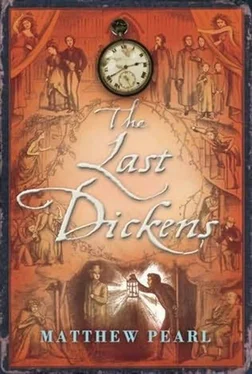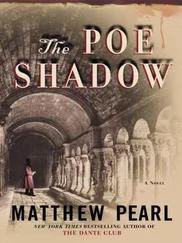“I feel the paths before us narrowing, Miss Sand. With Forster having authorized the theater production of The Mystery of Edwin Drood , it is in the interest of his reputation and his purse that if there are other clues waiting to be discovered, they be revealed only if they happened to match the ending written by Walter Stephens. Likewise, even if Wilkie Collins has no intention of finishing his friend's last novel, that rumor may give some member of the Dickens family the idea of finding someone else for the task. With every last floorboard and ornament from Gadshill to be auctioned any day, the family is eager for income. We are without any allies here in our search, Miss Sand.”
“But if you find the patient, how will you convince him to speak sensibly?”
“What is it Henry Scott said? A mad beast needs a sober driver.”

REBECCA INQUIRED WITH Henry Scott at Gadshill, who questioned the other servants and determined that the mesmerism patient had not been there since their encounter with him in the chalet. There were bets among the staff on whether the fellow had given up or died. But Rebecca suggested that if the patient had been at Westminster Abbey the day that she and Osgood visited, it might be one of his regular stops.
Osgood, agreeing, returned to the Poets’ Corner. When he visited Dickens's grave again, he found the same peculiar purple flower. From then on, Osgood went to the Abbey at intervals waiting for this other man to show. “It is only a matter of time, I'm certain,” he'd say to Rebecca.
On one visit in particular, Osgood and Rebecca passed through the gates together at the same time as Mamie Dickens, holding her little dog in her bag and linked to another young woman on her arm. Mamie wiped away her tears and smiled sweetly at the sight of Osgood and Rebecca.
The woman on Mamie's arm was small and perky, having a strong resemblance to Charles Dickens around her face. She wore an old-fashioned muslin kerchief on her head from which red ringlets dropped, decorated with distinctly nonmourning double hollyhocks. Her lace cape only barely kept her little shoulders concealed and her neck and throat were almost entirely exposed.
She was presented to Osgood and Rebecca as Katie Collins, the younger of the two Dickens girls.
“Oh, be proper, Katie!” Mamie scolded her sister, pulling her sister's cape over her shoulders. “In a church, too!”
“Proper! Now you sound like old Beadle Forster. Sometimes I wonder whether I got married to make dear father happy when our household had little other than sadness. Or did I marry because I knew father and his Beadle despised my husband?”
“Katie Collins!”
“Intolerable and stuff!” Katie imitated Forster's voice and then rubbed her hands together like he would.
“Tell me,” Osgood said. “Do you know who the man was who had come to him at Gadshill for treatment in the last few months, a tall man with a military air and long white hair?”
Mamie nodded. “I think I have seen the man you mean at the house. He was a very persistent and dedicated follower of father's methods. Even when father was delayed for their appointments, he would sit outside the study for hours.”
“Do you know his name?” Osgood asked.
“I am afraid I don't,” Mamie said, with a sigh. “Father was a mesmerism fanatic of no mean order and believed it a remedy for any illness. I know of many cases, my own among the number, in which he used his power in this way with perfect success. He was always interested in the curious influence exercised by one personality over another.”
“Now, Sir Osgood.” Katie, bored with the exchange, examined the publisher flirtatiously. “Where were you when a girl was to find a husband?”
Rebecca seemed as embarrassed at the question as Osgood. Katie raised an eyebrow to show she had noticed this.
“Miss Sand,” sharp-tongued Katie said, “do you not think Mamie should look just smashing in a bridal gown on the arm of a man like this?”
“I suppose so, ma'am,” Rebecca replied demurely.
“You are the sort of girl who thinks well of weddings, Miss Sand?” Katie pressed.
“I don't think much of weddings at all,” Rebecca replied.
Mamie interrupted the awkward moment. “Mr. Osgood and Miss Sand have come all the way here for business, Katie, and to find out more about The Mystery of Edwin Drood. ”
“What a bore business is,” said Katie, snapping her fingers. “Oh, very well. Do you really want to find your way through the tangled maze and arrive at the heart of the mystery? If you want to know about Drood's ending, simply buy me a new ribbon for my hair! We are auctioning all mine.”
“Oh, don't always tease everyone, Katie!” Mamie cried.
“I'll tell them then,” Katie said while coyly wrapping one of her red ringlets around her finger. “Drood will be dead or alive; Rosa will marry Tartar or become a nun; Dick Datchery will find Drood's body or find Drood playing cribbage in a cellar with Rosa's guardian, Grewgious. I don't know the first thing about it! And that is the answer to the riddle.”
“What do you mean?” Osgood asked.
“The old Beadle, faithful little Aunt Georgy, my wayward brothers, none of those dear creatures know how it was to end because Father didn't wish them to know-he didn't wish anyone in the universe to know except himself, Mr. Osgood. It was a game for him, you see. He always loved to surprise us and was completely thorough when he had set his mind on it.”
BACK AT THE Falstaff Inn that same evening, “Sir Falstaff” brought tea to Osgood as he sat contemplatively by the fireplace downstairs. Rebecca had retired to her room to read. Sir Falstaff's mind seemed to wander and the tray slipped, shattering the pot and cup.
“I apologize, Mr. Osgood,” the landlord said after the shards had been swept away and the spilled tea mopped by his sister. He seemed saddened by something other than the broken porcelain.
Osgood followed the landlord's gaze and found its focal point. It was one of the leafy purple flowers left at the Abbey: Osgood had taken it with the intention of asking one of the street vendors that sold plants to identify it for him.
“This is an ugly thing, isn't it, Sir Falstaff? I'm sorry for gracing your table with such a shockingly nasty weed,” he said. “Are you unwell? Shall I fetch some ice water?”
The trembling man waved him away. “Mr. Osgood, did you not know? That… that is an opium poppy! It feels like I have been struck in the heart by a bludgeon.”
“I did not know!” Osgood said apologetically, though he still could not comprehend the proprietor's reaction.
The landlord gazed with a doomed expression into the small fire, and removed his cap and folded it over his lap. “You couldn't have known, Mr. Osgood. Many years ago, I learned to hate that vile plant. My son had only twenty summers to his name and his faculties of judgment, and it was to the evil seduction of that plant that we buried him. The house was so empty without him. That is why, after he was gone, I moved here with my sister from our home in town to manage this snug little inn: to give other people pleasure when you have lost all of your own is a small miracle.”
Osgood crumpled the flower into the pocket of his vest as casually as possible. Poor Sir Falstaff did not move at all, his expressionless face hanging low.
“But what's this? Enough of that solemn manner.” The landlord suddenly rose from his chair, putting his hat and cheer back on. “Yes, enough of that, how about some ale to pluck us up?”
The next day, Osgood again took the noisy train to Charing Cross. Osgood planned to attend the auction at which the belongings from the Gadshill estate were to be sold to benefit the Dickens family.
Читать дальше













